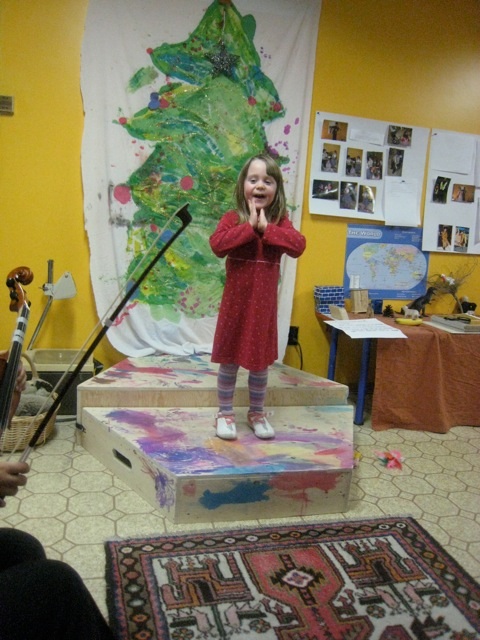“The moment you say ‘I know everything’ is the end of your growth.”
Sharon Lee

“Pip, you need to put some clothes on,” is a phrase I find myself uttering, not just in the morning, but several times a day. My daughter simply prefers to be naked. Oh, we insist on underpants, but that’s about all we can get her to consistently wear. It doesn’t help that we have a toasty warm fire burning in the living-room fireplace throughout the day. When we arrive home from pre-school, or some other daily outing, Pip strips down to her underwear, takes either a toy or books into the living room, and plops down on the carpet in front of the fire.
She says that clothes are ‘scratchy.’ Thus, we only buy ‘soft’ clothes for her. My sister hands-down the most wonderful jeans and chords from my niece, but Pip will not wear them. She doesn’t like tags on anything; even stuffed animals. Pip doesn’t like people close to her wearing ‘scratchy’ clothes either, and she won’t hug me when I’m wearing my favourite wool sweater.
Pip is a sensitive soul. From the time she was only a few months old, I knew that she was an observer. I remember taking her to a baby music class when she was about 10 months old and being surprised at the fact that she didn’t want to participate. She loved music! We sang and played instruments at home all the time, but during the music class, she just wanted to sit on my lap and watch what was going on around her. This behaviour continued week after week and by the end of the session she had just started to feel comfortable enough to take part, but even then, it was only the familiar activities that she enjoyed.
My husband and I have never wanted to label Pip as being ‘shy,’ but new people in her life will often say, “Are you shy?” or “Don’t be shy,” if she doesn’t engage with them right away. I don’t like it, because I feel that she is being misunderstood. She is a confident, happy little person, but she likes to observe people and situations before she acts. She’s also incredibly empathetic. If a child is upset on the playground, or if her little sister is out of sorts, Pip’s eyes will well up with tears. Empathy is a wonderful trait, but it must be exhausting for Pip to take on the emotions of other children.
Does any of this sound familiar to you? It was only recently that it all made sense to me and I came to a new understanding about my daughter and myself. Last summer, my insightful cousin Sheryl read a book about ‘Highly Sensitive People.’ She said that it made her think of me and Pip. It took me awhile to get around to it, but I finally looked at the author’s website. I read through the checklist for ‘Highly Sensitive Children,’ and Pip exhibited almost ALL of the character traits.
I had many, ‘Aha,’ moments as I sifted through the information on the website, because it turns out that I possess many of the adult ‘HSP’ traits. It was enlightening, and also incredibly comforting. Especially this bit:
- Your trait is normal. It is found in 15 to 20% of the population–too many to be a disorder, but not enough to be well understood by the majority of those around you.
- It is innate. In fact, biologists have found it to be in most or all animals, from fruit flies and fish to dogs, cats, horses, and primates. This trait reflects a certain type of survival strategy, being observant before acting. The brains of highly sensitive persons (HSPs) actually work a little differently than others’.
- You are more aware than others of subtleties. This is mainly because your brain processes information and reflects on it more deeply. So even if you wear glasses, for example, you see more than others by noticing more.
- You are also more easily overwhelmed. If you notice everything, you are naturally going to be overstimulated when things are too intense, complex, chaotic, or novel for a long time.
- This trait is not a new discovery, but it has been misunderstood. Because HSPs prefer to look before entering new situations, they are often called “shy.” But shyness is learned, not innate. In fact, 30% of HSPs are extraverts, although the trait is often mislabeled as introversion. It has also been called inhibitedness, fearfulness, or neuroticism. Some HSPs behave in these ways, but it is not innate to do so and not the basic trait.
- Sensitivity is valued differently in different cultures. In cultures where it is not valued, HSPs tend to have low self-esteem. They are told “don’t be so sensitive” so that they feel abnormal.
The author’s name is Elaine Aron and her homepage can be found at: www.hsperson.com/index.html
I don’t know if this information is of interest to people who aren’t highly sensitive, but this learning experience has reminded me, yet again, what incredible teachers my daughters are and how much I have to learn.
I’ve come to a deeper understanding about Pip, as well as myself, and I’ve found a great resource for both of us. I’ll be better equipped to help Pip when her eyes water because some child on the playground is crying. I’ll be more tolerant when she refuses to wear a new shirt. I’ll also be easier on myself. (Thank you, cousin Sheryl!)
In the end, I think it all comes down to acceptance. Acceptance of our kids, our spouses, our parents, ourselves…not judgement, but acceptance. Amen to that.